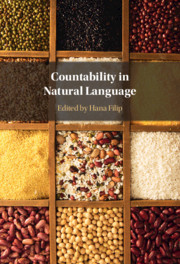Book contents
- Countability in Natural Language
- Countability in Natural Language
- Copyright page
- Contents
- Contributors
- Preface
- Introduction
- 1 Proportional Many/Much and Most
- 2 Quantity Systems and the Count/Mass Distinction
- 3 Counting Aggregates, Groups and Kinds: Countability from the Perspective of a Morphologically Complex Language
- 4 Individuating Matter over Time
- 5 Reduplication as Summation
- 6 Iceberg Semantics for Count Nouns and Mass Nouns: How Mass Counts
- 7 Indexical Inference: Counting and Measuring in Context
- 8 Counting and Measuring and Approximation
- 9 The Count/Mass Distinction for Granular Nouns
- Index
- References
2 - Quantity Systems and the Count/Mass Distinction
Published online by Cambridge University Press: 11 June 2021
- Countability in Natural Language
- Countability in Natural Language
- Copyright page
- Contents
- Contributors
- Preface
- Introduction
- 1 Proportional Many/Much and Most
- 2 Quantity Systems and the Count/Mass Distinction
- 3 Counting Aggregates, Groups and Kinds: Countability from the Perspective of a Morphologically Complex Language
- 4 Individuating Matter over Time
- 5 Reduplication as Summation
- 6 Iceberg Semantics for Count Nouns and Mass Nouns: How Mass Counts
- 7 Indexical Inference: Counting and Measuring in Context
- 8 Counting and Measuring and Approximation
- 9 The Count/Mass Distinction for Granular Nouns
- Index
- References
Summary
This chapter analyses the connections between quantity expressions, which, in English, include expressions such as three, several, a few, much, and many, and the mass/count distinction. Based on cross-linguistic evidence from Brazilian Portuguese, English, Mandarin, and Yudja, amongst others, Doetjes argues that quantity expressions can be exhaustively subdivided into two classes: count quantity expressions, which presuppose the availability of units that can be counted, and non-count quantity expressions, which do not presuppose the availability of units that can be counted. Anti-count quantity expressions, which presuppose the absence of units that can be counted, are subsumed under the class of non-count quantity expressions. On the basis of this distinction, Doetjes argues that while we may expect to find languages in which all nouns have a count denotation (Yudja being a good candidate), it is not predicted to be possible for there to be languages in which all nouns have a mass denotation.
Keywords
- Type
- Chapter
- Information
- Countability in Natural Language , pp. 52 - 84Publisher: Cambridge University PressPrint publication year: 2021
References
- 39
- Cited by

